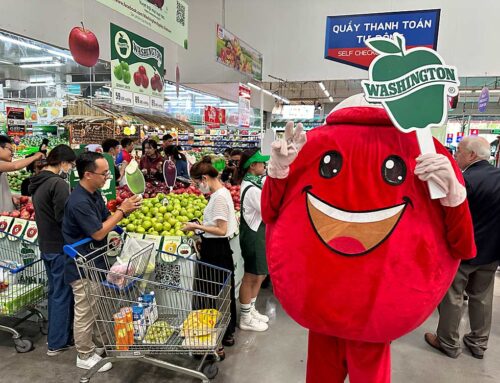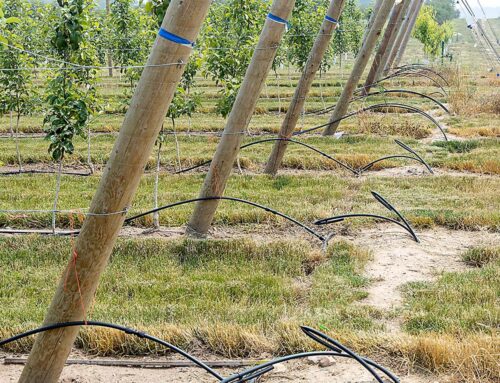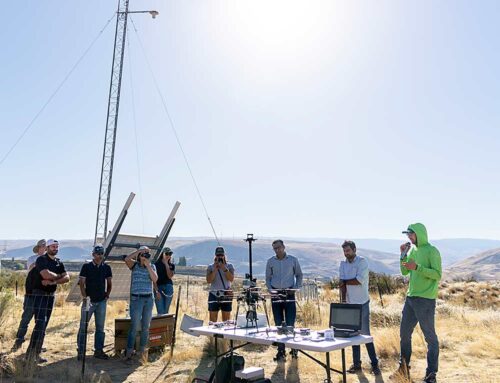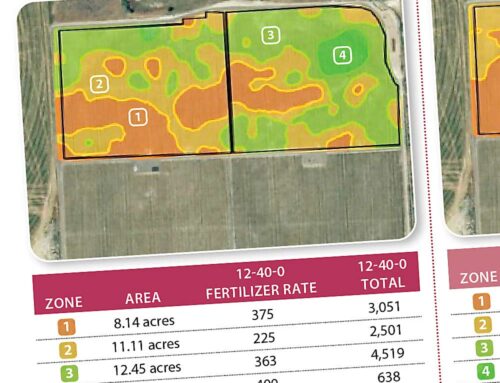Incorporating mustard seed meal into the soil before planting trees is an effective way to control replant disease, research shows.
But is it practical?
The blend of white and yellow mustard seed that Dr. Mark Mazzola tested is available from Farm Fuels, Inc., of Watsonville, California. The company makes biofuels for use in trucks and tractors in California, and the seed meal is a byproduct, which it sells as a fertilizer.
Stefanie Bourcier, chief executive officer and research director at Farm Fuels, said the company sells the mustard seed meal to California strawberry growers, who have to treat the soil annually before replanting and are using it as an alternative to fumigation. The treatment is effective for various crops, and the company has some customers in the Pacific Northwest.
The seed meal costs about $1,500 to $1,600 a ton, depending on the quantity ordered. The rate that Mazzola, a U.S. Department of Agriculture plant pathologist, found most effective in his trials was three tons per acre, but David Granatstein, Washington State University sustainable agriculture specialist, said only the soil in the tree row would need to be treated.
Figuring a tree-row width of three feet and ten feet between rows, just under a third of each acre would be treated, meaning the actual rate would be less than a ton.
Shipping costs vary, depending on the availability of trucks. Bourcier said a good time for Washington growers to buy seed meal from California is during peak apple shipping periods, when trucks can backhaul the seed meal rather than return to Washington empty.
Assuming a delivered cost of, say, $1,800 per ton, would that pencil out?
Tim Smith, WSU extension specialist based in Wenatchee, estimates that treating replant disease with fumigation boosts fruit yields by a third over the life of an orchard compared with an untreated orchard. Mazzola, in his trials, found that seed meal-treated plots were even more productive.
In comparison, broadcast fumigation with Telone C-17 (1,3-dichloropropene and chloropicrin) costs about $800 to $900 per acre. But Mazzola has found that the seed meal treatment provides longer-lasting protection against nematodes than does fumigation. Both fumigation and the seed meal suppress nematodes initially, but in fumigated plots, the nematodes quickly repopulated the root zone. He also found that the Pythium fungus quickly reappeared in fumigated ground.
Mazzola found that the seed meal treatment is most effective when the ground is covered with plastic for a week after it is incorporated into the soil. He noted that fumigation would also be more effective if the ground was covered, though that’s not a standard practice in Washington.
Bourcier said most of their agricultural customers, such as strawberry growers, use a black plastic mulch, though some use a biodegradable mulch. However, the seed meal still provides benefits, even if it is not economical to cover the ground after treatment.
Granatstein said another benefit of seed meal is that it supplies all the nitrogen the new orchard needs for the first three years, so that represents a savings in fertilizer. It also helps suppress weeds, which could mean fewer herbicide applications.
Seed meal qualifies as an organic treatment, whereas fumigation does not. A common practice among organic growers is to drop the orchard’s organic status when the old trees are removed so that the ground can be fumigated. It takes three years to transition back to certified organic status, about the same length of time it takes the trees to produce their first crop.
With the seed meal treatment, the orchard could keep its organic certification.
Apart from not being organic, fumigation is subject to safety regulations and application buffers.
Plant in Washington
Most of the seeds that the company processes are grown in the Pacific Northwest—primarily in eastern Washington—and shipped to California, where most of the biodiesel customers are. However, the company is planning to build a processing facility in eastern Washington by 2015, which would greatly reduce shipping costs for Northwest growers. Bourcier also hopes to do more trials with the seed meal in the Northwest.
The seed meal is labeled for use in Washington as a fertilizer, but the company is working with the U.S. Environmental Protection Agency to obtain a biopesticide label, which is also expected in 2015.






Can the seed be used in holes where replacement trees will be replanted? Or is it like fumigation and can’t be done in a producing orchard? How is it applied?
Thank you
Renee’
Are you allowed to send mustard seed meal to Canada?
I would love some to combat liverwort moss.
Thx, Carol